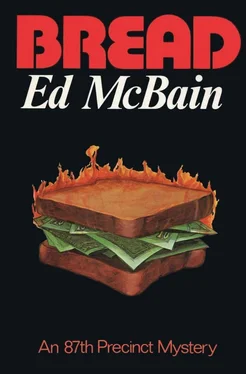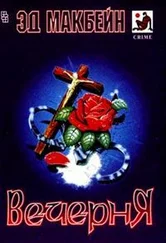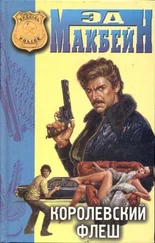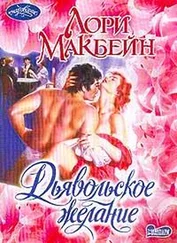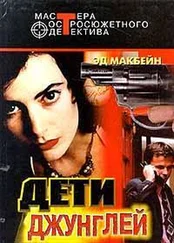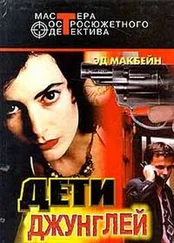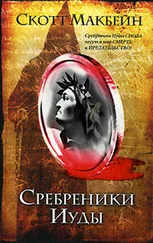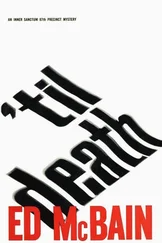Hawes went into the vestibule and checked the mailboxes. There were twelve boxes in the row. Eight had broken locks. Only one of them had a name in the space provided, and the name was not Charles Harrod’s. Hawes came out onto the stoop again. The street gang members had disappeared. The fat man was watching the kids playing under the water.
“Good morning,” Hawes said.
“Morning,” the man replied briefly. He put both straws between his lips, sipped from the bottle, and kept looking at the kids.
“I’m looking for a man named Charles Harrod...”
“Don’t know him,” the man said.
“He’s supposed to live in this building...”
“Don’t know him,” the man repeated. He had not taken his eyes from the children playing near the fire hydrant.
“I was wondering if you knew what apartment he lived in.”
The man turned and looked up at Hawes. “I just told you I don’t know him,” he said.
“Know where I can find the super of the building?”
“Nope,” the fat man said.
“Thanks a lot,” Hawes said, and walked down the flat steps to the pavement. He wiped the back of his hand across his sweating upper lip, and then went into the pool hall. There were two tables in the place, one of them empty, one of them occupied by the gang members he had seen standing outside a few minutes ago. Hawes walked over to the table. “I’m looking for a man named Charles Harrod,” he said. “Any of you fellows know him?”
A young man, leaning over the table, stick in hand, said, “Never heard of him,” and triggered off a shot that sank two balls and left the cue ball in position for an easy chip shot. He was tall and thin, sporting a black beard and mustache, the back of his denim jacket ornately painted with the name of the gang — The Ancient Skulls — curving over an appropriate painting of a grinning white skull and crossbones. Hawes thought he had seen the last of the street gangs twenty years ago, but he supposed all good things — like plagues and locusts — returned at regularly spaced intervals.
“He’s supposed to live in the building next door,” Hawes said.
“We don’t live in the building next door,” another of the young men said. He was bigger than the bearded one, almost as big as Hawes, the pool cue looking undersized in his enormous hands.
“Where do you live?” Hawes asked.
“Who wants to know?”
“I’m a police officer, let’s cut the crap,” Hawes said.
“We’re shooting a friendly game of pool here,” the bearded one said, “and we don’t know Charlie whatever-his-name-is...”
“Harrod.”
“We don’t know him. So, like, what’s the beef, Officer?”
“None at all,” Hawes said. “What’s your name?”
“Avery Evans.”
“And you?” Hawes said, turning to the big one.
“Jamie Holder.”
“And none of you know Harrod, huh?”
“None of us,” Holder said.
“Okay,” Hawes said, and walked out.
The fat man was still sitting on the stoop. His Coke bottle was empty and he had placed it between his shoes. Hawes climbed onto the stoop and went into the vestibule. He opened the broken glass door dividing the vestibule from the inner hallway, and then started up the flight of steps to the first floor. The hallway stank of urine and cooking smells. He rapped at the first door he came to, and a woman inside said, “Who is it?”
“Police officer,” he said. “Want to open up, please?”
The door opened a crack. A woman with her hair tied in rags peered into the hallway. “What is it?” she said. “Nothing’s happened to Fred, has it?”
“Nothing’s happened to anybody,” Hawes said. “I’m looking for a man named Charles Harrod...”
“I don’t know him,” the woman said, and closed the door.
Hawes stood in the hallway a moment longer, debating whether he should go through this routine with every apartment in the building, and finally decided to go find a cop. He found one up the block, near the corner, a black patrolman turning off the fire hydrant there with a monkey wrench. Kids in swimming trunks danced around him as the patrolman worked, sweating in his blue uniform, armpits stained. They shouted at him, and taunted him, and splashed their feet in the curbside puddles, hoping to get him as wet as they were, but he steadfastly turned the octagonal brass fitting until the stream of water became a trickle and then stopped entirely. He screwed both heavy iron caps back onto the hydrant, and then fitted a new lock into place, a lock that would be broken before the day was out, just as its predecessor had been broken.
“You want to use the hydrants, go get a spray attachment,” he said to the assembled kids.
“Go hump your mother,” one of the kids said.
“I already humped yours,” the patrolman answered, and began walking up the block toward the next hydrant.
Hawes fell into step beside him. “Got a minute?” he said, and flashed his detective’s shield.
“What’s up?” the patrolman asked.
“I’m looking for a man named Charles Harrod, 1512 Kruger. Would you know what apartment he’s in?”
“Harrod, Harrod,” the patrolman said. “Big guy, white Cadillac, tailor-made suits, knife scar down the left side of his face. That the one?”
“Sounds like him.”
“Building near the pool parlor,” the patrolman said. “Is that 1512?”
“That’s 1512.”
“He lives on the top floor, I don’t know the apartment number. There’s only two apartments on each floor, so you can’t go wrong.”
“Thanks, pal,” Hawes said.
“Don’t mention it,” the patrolman said, and walked off carrying his monkey wrench. Up the block, the kids had already seen him coming and were already starting to chant.
Hawes went back to the building. Inside the church next door, the congregation had begun singing. The fat man on the stoop was tapping his foot in time to the music. He knocked over the Coke bottle and bent to pick it up as Hawes went past him again and into the dark vestibule. The heat on the upper stories of the building was stifling. Hawes reached the sixth floor and knocked on the door nearest to the stairwell. There was no answer. He knocked again, and this time a voice said, “Who’s there?” The voice was pitched very low; he could not tell if it belonged to a man or a woman.
“Charlie?” he said.
“Charlie ain’t here right now,” the voice said. “Who’s that, anyway?”
“Police officer,” Hawes said. “Mind opening the door?”
“Go away,” the voice said.
“I’ve got a warrant for the arrest of Charles Harrod,” Hawes lied. “Open the door, or I’ll kick it in.”
“Just a minute,” the voice said.
Hawes moved against the wall to the side of the door — just in case the voice inside was Charlie Harrod’s, and just in case Harrod had shot Frank Reardon to death, and just in case his lie about the warrant resulted in a fusillade of bullets through the wooden door. He unbuttoned his jacket and cleared his holster. Footsteps were approaching the door. The door opened wide.
A young black girl was standing in the doorway, backlighted with strong sunlight that blazed through an open kitchen window. She was wearing dungarees and a pink halter top. She was tall and slender, with long narrow fingers and an Afro hairdo that billowed from her head like a cloud of smoke. Her eyes were brown and savvy and distrustful and angry. In her low, hoarse voice, she immediately asked, “Where’s the warrant?”
“I haven’t got one,” Hawes said. “Does Charles Harrod...?”
“Goodbye,” the girl said, and started to close the door.
Hawes stuck his foot into it. “Don’t make me go all the way downtown for one, honey,” he said. “I get mean as hell when I have to go to all that trouble.”
Читать дальше
